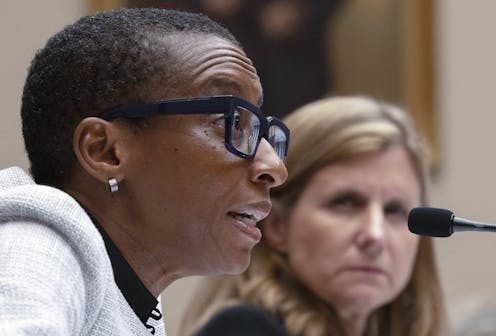
Harvard University President Claudine Gay resigned on Jan. 2, 2024, less than one month after University of Pennsylvania President Liz Magill stepped down. They called it quits amid uproar among conservative lawmakers and several major donors regarding what they saw as Gay’s and Magill’s underwhelming responses to antisemitism on their campuses. In Gay’s case, there were also accusation of plagiarism.
Some members of the public have been surprised to see that both Gay and Magill remain employed by their universities as professors and researchers. Ray Gibney, a management scholar who studies labor relations, explains why university presidents with tenure can remain on faculty and resume their teaching jobs after they leave or lose their administrative positions.
What does having tenure mean?
Tenure, as the American Association of University Professors defines it, is “an indefinite appointment” that protects academic jobs. Obtaining it is hard and takes years. Universities can fire a tenured professors only for cause or under what the association calls “extraordinary circumstances” – such as if their school experiences a financial crisis or their department gets eliminated.
Tenure is university specific. If a tenured professor gets hired by another school, they lose those protections unless their new academic institution grants them again.
Scholars who serve as the president, provost or deans have different responsibilities than regular faculty.
Regardless of whether an administrator comes from a traditional academic background or a nontraditional background such as business or politics, the employment offer usually includes a tenured faculty position.
University presidents serve at the pleasure of their institution’s board of trustees. The board can revoke their administrative role. But revoking a scholar’s tenure and the job security that goes with it requires a formal process and investigation.
However, universities rarely end tenure, even when they find evidence that a tenured professor is incompetent.
Does it matter that Gay and Magill stepped down instead of being fired?
Gay and Magill both resigned as president of their universities. Because neither quit their faculty jobs, they remain employed by Harvard and Penn, respectively.
Whether administrators quit or are fired has little bearing on whether they can hang on to their tenured faculty position. When administrators are fired it can justify an investigation of whether there’s cause for their dismissal as tenured faculty too. But it’s not a guarantee.
To remove either from the faculty roles, the university-specific process of revocation of tenure would need to be initiated. Every college and university defines its own reasons for tenure revocation, with moral turpitude and excessive absenteeism common grounds for dismissal.
What might happen to their salaries and other compensation?
University administrators generally do not teach classes. The culture of the academy is to provide administrators who are returning to faculty ranks with a short period – typically one semester – to review and update course teaching materials to get ready to teach again.
During this time period, they are often paid their administrator salaries. However, compensation is usually adjusted back to comparable faculty salaries upon their return to faculty ranks.
Neither former president’s salary has been made public, since they were both recent hires and those details are typically released with a significant delay. Gay, according to media reports, earns at least US$880,000 a year. Magill’s predecessor made $1.56 million, plus millions more in deferred compensation.
What’s the purpose of tenure?
It’s primarily supposed to foster academic research and academic freedom. Once granted tenure, professors and other faculty members may feel more free to research topics that might not be politically popular or that their superior might not approve.
Having tenure also makes it easier for professors to discuss sensitive but appropriate topics with their students without fear of reprisal.
What would it take for them to be fired?
Firing any tenured faculty member is a lengthy process.
Even if it doesn’t involve a professor who got caught up in a contentious news cycle, the school would form a committee to evaluate any possible charges. The process can take months or years.
Given the allegations of plagarism in Gay’s case, she would appear to be in a more precarious situation, but by no means would her dismissal be guaranteed.
What’s changing with tenure?
The share of nontenured faculty is growing quickly. Those professors and lecturers, who outnumber professors with tenure on U.S. campuses, generally teach more courses and earn less money.
This creates a double incentive for universities, which essentially get more labor at a cheaper price. This arrangement can leave academics scrambling with little notice due to a lack of job security.
Tenure, for now, is keeping Gay and Magill on the payrolls of Harvard and Penn. It is possible, but highly unlikely, that proceedings will be initiated to dismiss either for cause.
I’m anticipating a resurgence in the calls to do away with tenure.
Ray Gibney does not work for, consult, own shares in or receive funding from any company or organization that would benefit from this article, and has disclosed no relevant affiliations beyond their academic appointment.
This article was originally published on The Conversation. Read the original article.







